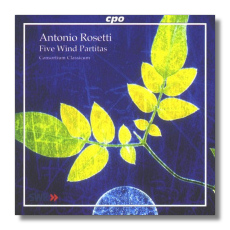
The Internet's Premier Classical Music Source
Related Links
- Rosetti Reviews
- Latest Reviews
- More Reviews
-
By Composer
-
Collections
DVD & Blu-ray
Books
Concert Reviews
Articles/Interviews
Software
Audio
Search Amazon
Recommended Links
Site News
 CD Review
CD Review
Antonio Rosetti

Partitas for Winds
- Wind Partita in D Major, Kaul II/8
- Wind Partita in D Major, Kaul II/9
- Wind Partita in D Major, Kaul II/11
- Wind Partita in D Major, Kaul II/14
- Wind Partita in F Major, Kaul II/15
Consortium Classicum
CPO 999961-2 DDD 72:11
A successful contemporary of Mozart, Antonio Rosetti (c. 1750 -1792) was quickly forgotten after his death. Those who wish to learn more about him have their work cut out for them; there isn't even agreement as to how his name should be given. He is believed to have been born in the region of Bohemia, and his name is somtimes erroneously given as Franz Anton (or František Antonín) Rössler (or Rösler). He was appointed to the court orchestra of a Prince Kraft Ernst zu Oettingen-Wallerstein, first as a bassoonist, and eventually as its music director, a post he held until 1789.
Rosetti wrote music in many genres, but his music for winds is particularly abundant and felicitous. In fact, he is credited with having written the world's first wind quintet. The five partitas included on this CD are likely to have been intended for outdoor use, because brass and woodwinds "carried" better than strings. A typical wind partita – for example, #8 on this CD – is scored for two oboes, two clarinets, two horns, one bassoon, and (presumably to buttress the music's harmonic foundations), one double bass. These works, each about fifteen minutes long, also are referred to as "wind serenades," and also as the "Wallerstein Serenades," as they were "dedicated with gratitude to His Highness Prince Moritz zu Oettingen-Wallerstein, the protector of the art of Rosetti."
Pop this CD in your player and collar any unsuspecting classical music aficionado and he is bound to say, "Aha, Mozart!" At his best, Rosetti reached Mozart's everyday standards; the only thing that Rosetti lacked was divine inspiration. However, to portray Rosetti as anything less than a competent, even gifted, composer would be to do him a great injustice. The music on this CD is always cheerful and gracious – very conducive to one's digestion! The variety of Rosetti's inspiration becomes even more impressive when one is reminded that flutes in the 1780s (when these works were written) could not be adapted to music in many different keys as easily as their modern counterparts can be.
The Consortium Classicum was founded in 1969 by clarinetist Dieter Klöcker, who remains associated with this ensemble. Its musicians continue to focus on music by composers who lived in central Europe during the late 18th and early 19th centuries. Their playing on this CD, which was recorded early in 1003, is honey-smooth and excellently blended, but never bland. Kudos to Consortium Classicum, then, and also to the CD's engineers, who give the musicians an "open" sound that is eminently suited to the repertoire.
Copyright © 2004, Raymond Tuttle



















